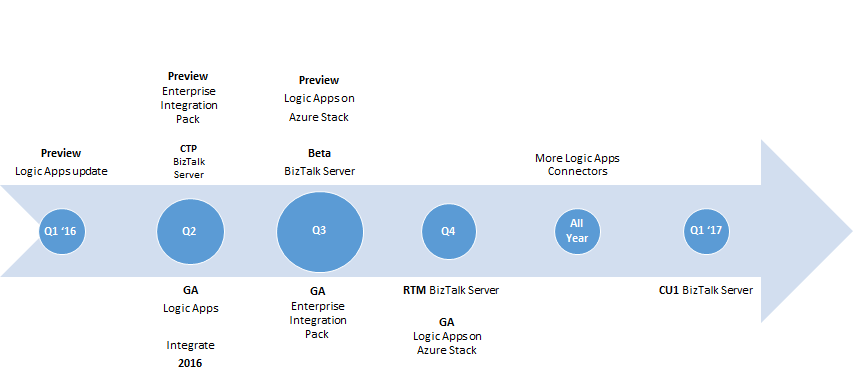Published on : Dec 24, 2015
Category : BizTalk Server
For a very long time there was lot of debate and frustration within the Microsoft BizTalk Server community, what is going to be Microsoft Roadmap with BizTalk + some of the new cloud integration offering like MABS (Microsoft Azure BizTalk Services), Azure App Services (LogicApps and API apps), to some extend with Service Bus (Queues and Topics).
Until this point there were no clear directions apart from a vague belief BizTalk Server will be released every 2 years once and Microsoft will continue it’s investment in the cloud. Recently Jon Fancey joined Microsoft product group and one of the very first task he promised us (Integration community – MVP’s, partners, customers) to do is to give a clear roadmap about the future of Microsoft Integration.
As promised Microsoft today released the public road map that gives the holistic approach to Integration and the key product offerings that contribute to Microsoft Integration strategy. They promised to keep this document updated regularly and put references to various assets across the integration stack. You can download the
Microsoft Integration Roadmap document here.
This is a great move from Microsoft, which will help customers, partners and ISV’s to make their future investments accordingly.
Key points from the Roadmap 1.0

- Continued commitment to BizTalk Server. There will BizTalk Server 2016 planned for Q4 2016.
- The cloud iPaaS offering will see a refresh in Jan 2016, and GA in April 2016.
- On premise (Azure Stack) version of iPaaS will be in preview by Q2 2016
- Host Integration vnext will be inline with BizTalk Server release.
BizTalk Server 2016 will be the 10th release of the product, a milestone to cherish.
BizTalk Server 2016 key features (planned)
The reason BizTalk 2016 is moved till Q4 of 2016 is mainly due to the dependency on Windows and SQL Server. As soon Windows Server 2016, SQL Server 2016 is shipped you’ll see BizTalk Server 2016.
Here are the key features announced on the road map.
- Platform alignment – SQL 2016, Windows Server 2016, Office 2016 and latest release of Visual Studio.
- BizTalk support for SQL 2016 AlwaysOn Availability Groups both on-premises and in Azure IaaS to provide high availability (HA).
- HA production workloads supported in Azure IaaS.
- Tighter integration between BizTalk Server and API connectors to enable BizTalk Server to consume our cloud connectors such as SalesForce.Com and O365 more easily.
Numerous other enhancements including
- Improved SFTP adapter
- Improved WCF NetTcpRelay adapter with SAS support
- WCF-SAP adapter based on NCo (.NET library)
- SHA2 support
Future Plans (probably after 2016)
- Supporting Dynamic ports with ordered delivery
- Performance and usability improvements to admin console
- Support for SAS authentication with WCF-NetTcpRelay
- LogicApps can be run on-premise in addition to Azure (thanks to Azure Stack)
Host Integration Server 2016
- New and improved BizTalk adapters for Informix, MQ & DB2.
- Improvements to PowerShell integration and installation and configuration

Modern Integration Vs Enterprise Integration
Clearly integration landscape is changing dramatically and there is a clear divide between modern integration which are SaaS and web-centric typically that happens outside your organisation and your traditional on-premise Enterprise integration that involves industry standards like EDI, HL7, AS/2, focus on high reliability, robustness, guaranteed delivery etc.
Microsoft is clearly positioning itself to address these two scenarios, even though they look like two different scenarios, they don’t see it as two different problems. They are simply different points in the holistic integration spectrum. Microsoft want to provide location and hosting flexibility, giving customer opportunity to pick and choose the right approach suitable for their business that will make sense, instead of technical limitation.
The future integration story is going to be a joint effort between multiple products covering on-prem and cloud.

The Future
There is a clear indication on the document, over a period of time the different offering (BizTalk Server, BizTalk Services and LogicApps) will converge together. This of course will be determined by the maturity level, adaption and more importantly customer sentiments. It also doesn’t mean Microsoft is going to create one gigantic integration product. The current offering (BizTalk Server, Services, Logic Apps and API Management) will continue to evolve and mature, giving options to customers.
LogicApps will soon have parity with BizTalk Services (MABS) offering, Microsoft mentioned the work is already underway. My personal assumption is BizTalk Service (MABS) will soon be replaced by LogicApps . LogicApps will also start seeing some interesting features that are already present in BizTalk Server. It will get matured to cover all major SaaS platforms and providers like Office 365, Salesforce, Dropbox, Box, etc.
The below picture summarizes the Microsoft Integration road map clearly

Summary
We are very delighted to see this clear roadmap from Microsoft, this clarifies lot of question what the Microsoft BizTalk Server customer been asking us for a while. Thank you Microsoft for this great initiative.
Click to explore more about Microsoft BizTalk Server 2016.



